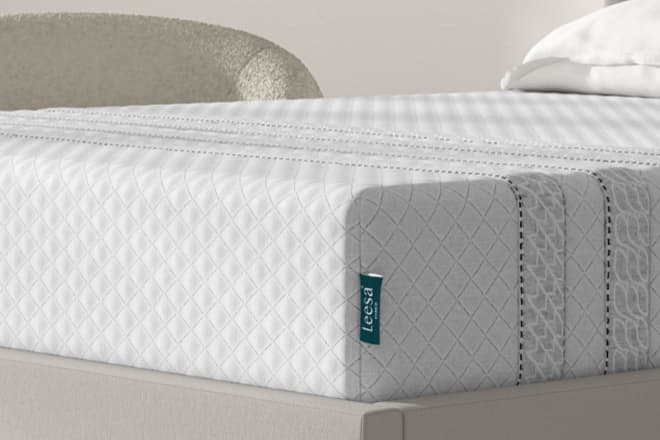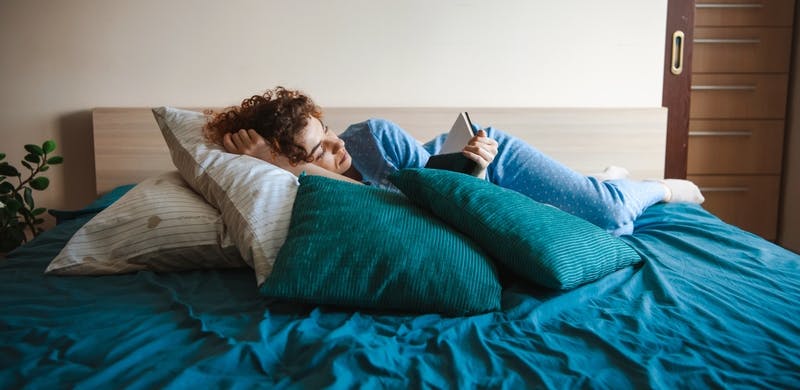If you've ever laid in bed staring at the ceiling, you're not alone. Sometimes it's hard to turn off your brain after a long day or the night before a big meeting or event. We've got your back.Hhere are some of our favorite strategies to help you sleep faster so you can get the R&R you need.
Tips for Falling Asleep Fast
There really are some easy ways to fall asleep fast — and stay asleep longer. Here are our 16 tips to fall asleep faster.
1. Make sure your room's temperature is ideal for sleep.
Sleep experts agree — the best temperature for sleep is 66-70 degrees.

2. Wear comfy, light clothing.
Nothing is worse than being hot while you sleep. Try loose light, cotton nightwear for your best rest.
3. Beware of caffeine before bed.
You should limit your caffeine before bed. Too much caffeine may keep you from falling asleep (and staying asleep!). Caffeine impacts everyone differently, so if you can't have coffee after 1 p.m., then don't! It's not worth losing sleep over.
4. Make sure you're getting enough exercise.
Exercise your muscles regularly to get your best sleep. Check out some of our favorite activities to do to sleep better at night.
5. Ban (or at least limit) screen time.
If you can, you should ban electronics in the bedroom. The blue light that electronics emit keeps your brain active, which you don't want at bedtime. Banning electronics an hour or so before bed is a good habit to get into.
6. Read a book before bed.
An actual, physical paper book, rather than an electronic reading device, is best for bedtime reading. It helps relax your mind, and the story can help distract your brain from any stress or anxiety.
6. Journal your thoughts and concerns.
This may sound silly, but if you get your concerns and worries out of your brain, it may help you get better rest. Alternatively, you can talk through problems or stressors with a partner or friend. Just set a time limit so that it doesn't consume your entire night.
7. Avoid alcohol before bed.
Some people enjoy a "nightcap," but that late-night drink could actually negatively impact your rest. (Psst! It's also important to stay hydrated during the day. That way, your body has the fuel it needs to recover while you sleep.)
8. Try playing white noise.
Buy a white noise machine, or download a white noise app on your phone. The constant, steady noise can help you fall asleep faster and stay asleep. It masks any outside noises or distractions, like a car outside or your partner snoring. Sounds can include raindrops, ocean waves, chirping insects, thunder, running water, and more.
9. Have the right lighting.
Dim the lights a few hours before bed to trigger your body to begin producing melatonin. Melatonin is the natural hormone your brain releases that tell your body it's time for sleep.
10. Make sure it's completely dark in your room.
Even the light from a clock or light from the hallway under the door can keep you awake. It goes back to melatonin production, and light can keep your body from producing the right amount to help you sleep.
11. Take 4-7-8 breaths.
Try taking “relaxing breaths," also known as the 4-7-8 exercise. Breathe in through your nose for four slow counts, hold your breath for seven, then slowly breathe out through your mouth for eight. This breathing pattern has the power to lower stress hormones and blood pressure (it's sometimes referred to as a natural tranquilizer).
12. Flip your pillow to the cool side.
Simple, but it works! Being too hot can keep you from falling and staying asleep. Want the ultimate cooling pillow experience? Check out our Ultra Cool Memory Foam Pillow, made with a cool-to-the-touch cover that pulls heat away from your body while you snooze.
13. Get the right pillow.
Make sure you have the right pillow for your sleeping position. A side sleeper needs a little more support from its pillow than a stomach sleeper.
14. Find the right sleeping position for you.
If you sleep on your back, try placing a rolled towel under your knees. Or, if you're a side sleeper, tuck a pillow between your legs. Did you know that the sleep position you prefer may say a lot about your personality?
15. Meditate or do yoga.
Try nighttime meditation or a short yoga practice before bed. There are also some handy apps that offer nighttime meditations, like Smiling Mind and Calm.
16. Create a sleep schedule (and stick to it!).
If you aim for the same bedtime and wake time every day, it can help you fall asleep faster and get better quality sleep.
If you're a parent, you already know that kids can have as much trouble getting to sleep as adults. Read about how to help your children sleep fast here. >>
For more sleep tips and tricks, visit our blog.
Whether it's a big step like buying a new Leesa mattress or pillow, or smaller steps like yoga, practicing mindfulness, journaling, doing breathing exercises, or avoiding caffeine and/or alcohol before bed. You'll increase your chances of falling to sleep within minutes — and staying asleep.
FAQs
How Long Should it Take to Fall Asleep?
The period between being awake and going to sleep is called "sleep latency" by sleep scientists. In general, studies show the average sleep latency for adults is 15–20 minutes. However, this isn't necessarily always the case. Some people — power sleepers, we like to call them — fall asleep almost immediately. Others may take up to 20 minutes.
How Do Soldiers Fall Asleep Fast?
The U.S. Army teaches new recruits the secrets to falling asleep within two minutes in less than ideal situations. It consists of four simple steps: Lie down and relax your face, including the muscles around your eyes, your jaw, and your tongue. Drop your shoulders as far down as possible, followed by your arms, one side at a time. Do a deep exhale, intentionally relaxing your chest, followed by your thighs and legs.
Clear your mind for 10 seconds with one of the following scenarios: Mentally repeat "don't think, don't think." Imagine you're lying in a black velvet hammock in a pitch-black room. Imagine you're lying in a canoe on a calm lake with a blue sky above you. Typically, this takes several weeks of practice before it starts to work, but some people report a much quicker result.
What is The 15-Minute Sleep Rule?
Invented by researchers at the University of Oxford in Great Britain, this rule states if you haven't dozed off within 15 minutes, get up. Then go into another room and repeat your wind-down routine again until you feel sleepy.



